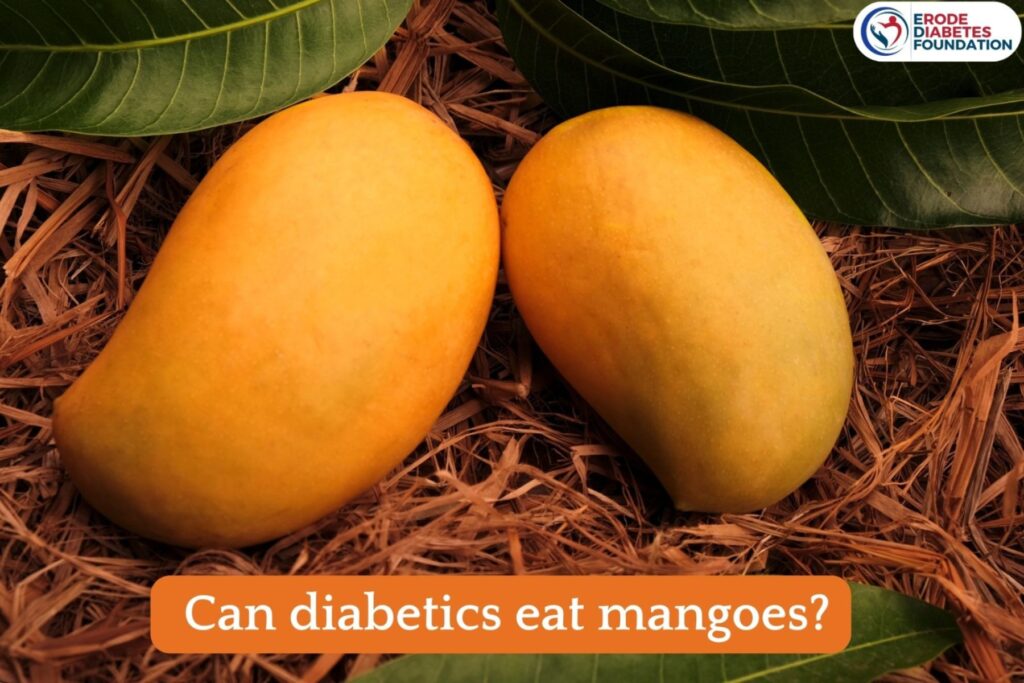Mangoes are popular in India, especially during summer. However, for individuals managing diabetes, enjoying mangoes can be tough due to their natural sugar content. In this blog, let’s address the common question among diabetics this summer: Can diabetics eat mangoes? Alongside, we’ll provide portion control guidelines and nutritional information to ensure you can eat mangoes without compromising your health.

Nutritional Profile
On average, 100 grams of mango contains:
- Calories: Around 60-70 calories
- Carbohydrates: Approximately 15 grams
- Fiber: Roughly 1.6 grams
- Sugars: About 14 grams
- Protein: Less than 1 gram
- Fat: Less than 0.5 grams
- In terms of vitamins and minerals, 100 grams of mango usually provides Vitamin C, Vitamin A (beta-carotene), Vitamin B6, Vitamin E, and Potassium.
Glycemic Index (GI) of Mangoes
Mangoes have a moderate glycemic index (GI) ranging from 51 to 60, which means they can cause a gradual rise in blood sugar levels. However, the ripeness of the mango can influence its GI, with riper mangoes having a higher GI than less ripe ones.
Can Diabetics eat Mangoes? Tips for safe Consumption
Limit portion size
It’s important to control the amount of mango you consume to manage your carbohydrate and sugar intake effectively. So, stick to a small serving of about 1/2 to 1 cup of diced mango, which contains roughly 15 grams of carbohydrates. Thus, this portion size allows you to enjoy the delicious taste of mango while keeping your blood sugar levels in check.
Pair with protein or fiber
Combining mango with protein-rich or high-fiber foods can help slow down the absorption of sugar into your bloodstream, preventing rapid increase in blood sugar levels. For example, you can enjoy mango slices with a handful of nuts or a serving of yogurt.
Do not eat overripe mangoes
Over ripe mangoes have a higher glycemic index, meaning they can cause a quicker rise in blood sugar levels. Moreover, choosing mangoes that are just ripe ensures you still enjoy the sweetness of the fruit without experiencing a rapid increase in blood sugar.
Monitor blood sugar levels
It’s essential to monitor your blood sugar levels before and after consuming mango to understand how your body responds to it. This practice allows you to identify any potential increase in blood sugar and make adjustments to your diet accordingly.
Eat mindfully
Practice mindful eating when enjoying mangoes. So, take your time to savour each bite and enjoy the flavours and textures of the fruit. Also, eating slowly can help prevent overeating and allows you to appreciate the experience of eating mangoes without rushing through the meal.
Benefits of Mangoes for Diabetes
- Mangoes are rich in vital vitamins and minerals.
- Mangoes contain dietary fibers, which helps regulate blood sugar levels and supports digestion.
- They are rich in antioxidants that reduce inflammation and support immune function.
- The potassium and fiber in mangoes promote heart health by lowering blood pressure and cholesterol levels.
- Mangoes are low in calories and can be a satisfying snack option for weight management.
Diabetes-friendly Mango Recipes
- Mango Yogurt Parfait
- Mango Lassi
- Coconut Chia Mango Pudding
- Grilled Mango Shrimp Skewers
- Mango Cucumber Salad
Be sure to modify portion sizes and ingredients to align with your dietary needs and preferences.
To Sum up
Your query, “Can diabetics eat Mangoes?” has been answered by this blog post. For more personalized advice consult with your diabetologist or dietitian to effectively manage diabetes while enjoying the foods you love, including mangoes.


